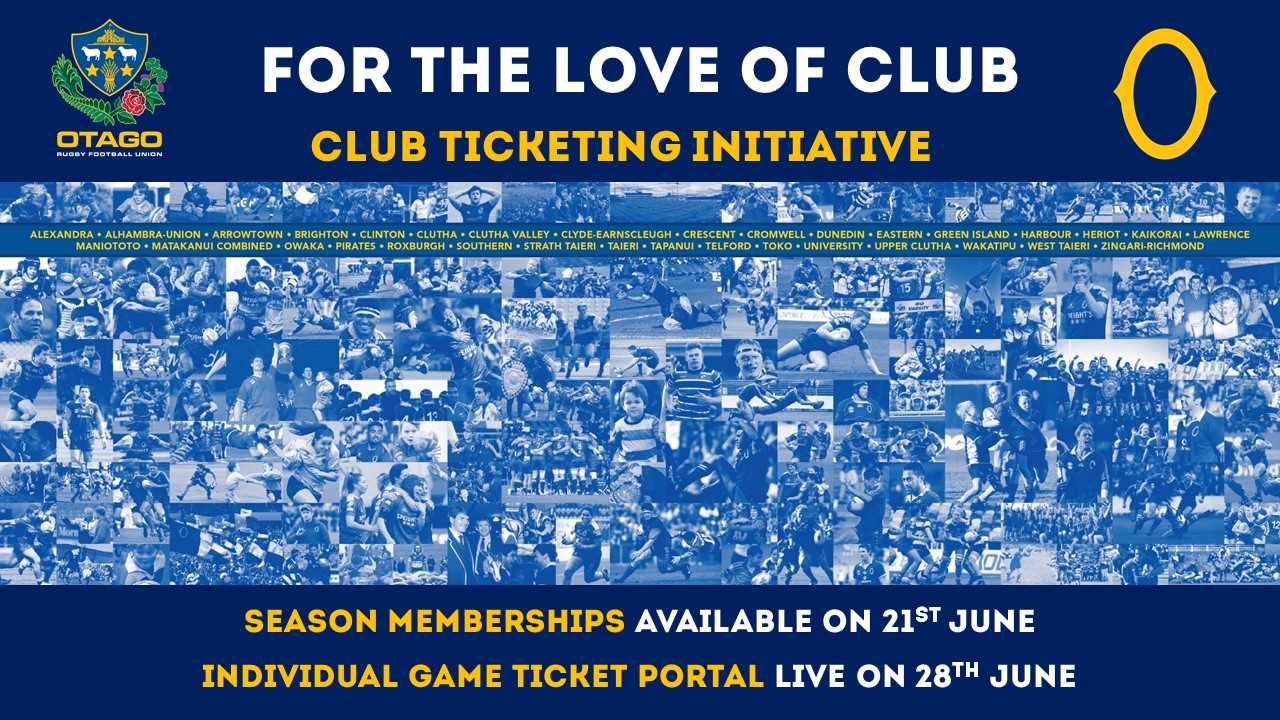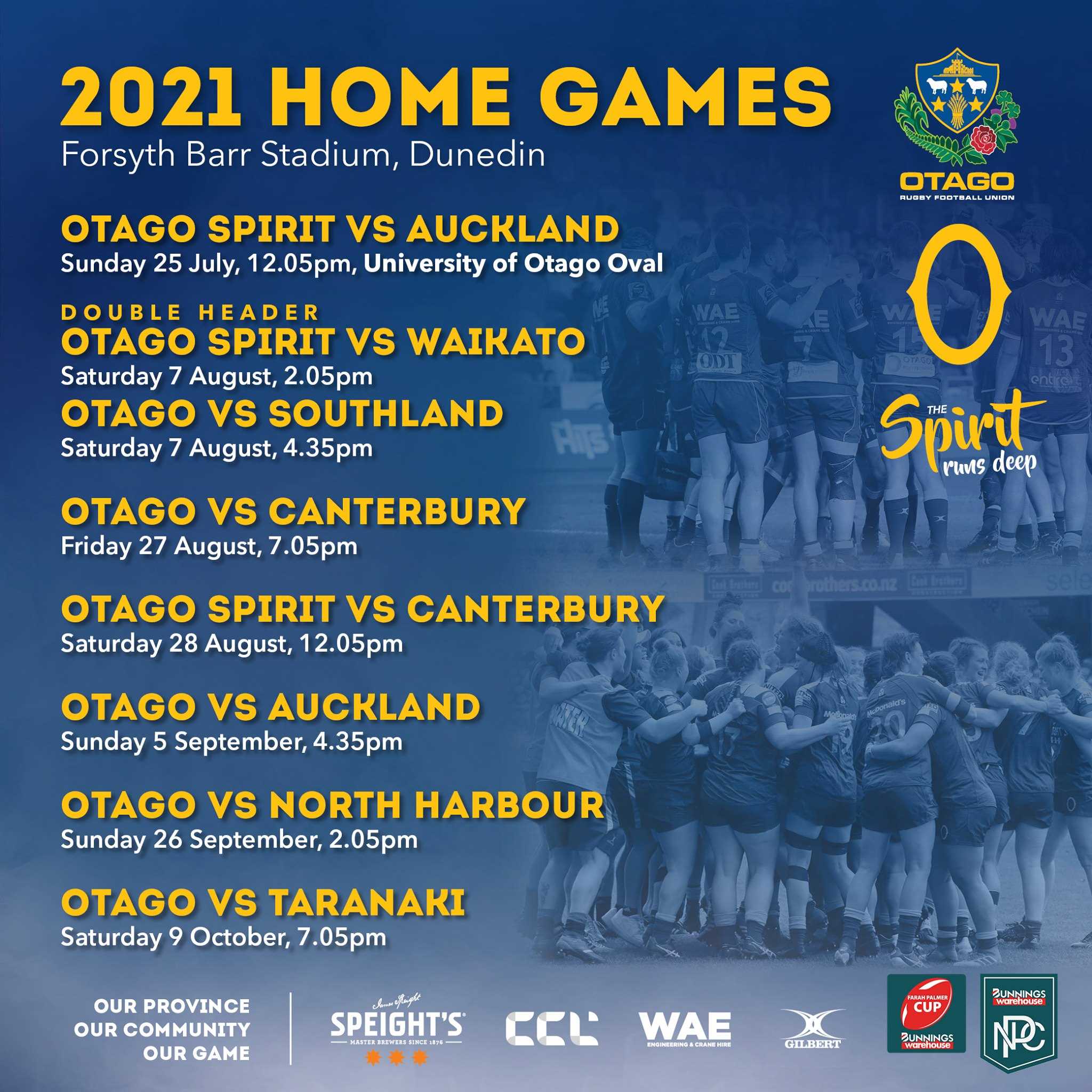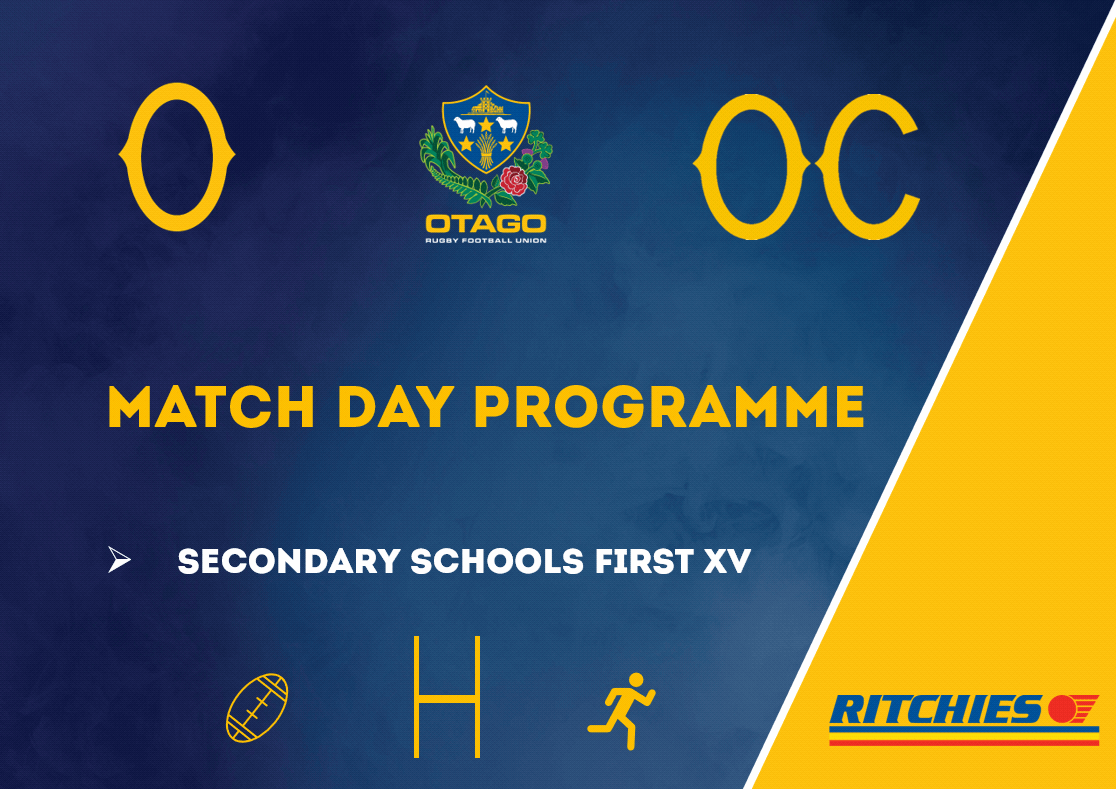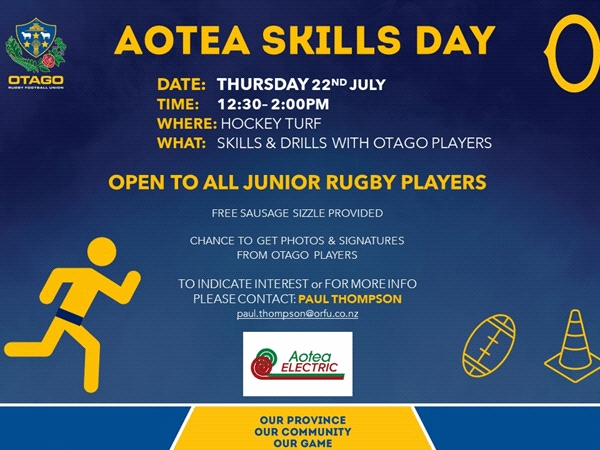 |
Otago Rugby Football Union Newsletter Stay up to date with the latest news from the Otago Rugby Football Union....Club Rugby, upcoming events, courses, NPC Cup action - you will find it all here! Don't forget to check www.orfu.co.nz for the latest news updates during the week and follow us on social media for breaking news, photos, videos and much more... NPC Cup Facebook, Community Rugby Facebook, Otago Spirit Facebook,  |
 |
Editorial Good afternoon Otago supporters & welcome to our weekly newsletter Our Otago Spirit girls had their first pre-season game against Canterbury this past weekend up in Christchurch. It was good to see the return of Greer Muir after a long injury layoff as well as introducing new faces to first class rugby. Final score: 55-12 to Canterbury. Not the result we wanted but a good hit out against the reigning champs. Congratulations to those lads selected in this years Otago Under 19s Wider Training Squad, the group has assembled outside of club commitments in preparation for their campaign in August and September. Check out the team selected below. The Otago Spirit ladies play their first away game against the Wellington Pride at Porirua Park in Wellington on Sunday 18th July at 11:35am. This game will be broadcast live on Sky Sport. Keep an eye out for the team announcement on our Otago Spirit Facebook and Instagram accounts. We had an awesome day out at The Taieri Rugby Football Club Inc at PJ Park in Mosgiel for our annual Norwood NZ Community Day. Our boys enjoyed getting stuck in and helping the next generation master some key rugby skills. Thanks to the good sorts from Taieri RFC who helped make it all possible. Our NPC season is fast approaching and we are looking to lock in 9 school visits across the Otago Province….. Get the opportunity for our boys to come and pass on their rugby knowledge to your school and if we visit during a week of one of our home games, your class can be part of the guard of honour on game day! Register your school here Season Memberships are now on sale! Membership forms can be located on our website here. If you wish to renew your membership or sign up for the first time you have until 5 August to lock in your seat. We have been delighted to see the response to our "For the Love of Club" initiative! Otago supporters can purchase tickets to all 5 Otago home games now on Ticketek. When purchasing be sure to enter the promo code for your club or the Otago Referees Association. A list of all clubs and referees promo codes can be found at the bottom of the page here see more on how much will be contributed and how to make your purchase below! Interesting Reads from Otago Daily Times:  |
 |
For the Love of Club Ticketing Initiative  |
 |
 |
 |
 |
 |
2021 Otago NPC & FPC Home Games  |
 |
 |
Club Rugby 2021  |
 |
2021 Premier Draw  |
For Southern Region, Central Region and Metro Premier Draws CLICK HERE: 1. Scroll down to your regional competition (Southern, Central or Metro). 2. Use the calendar tool bar on the upper right to change dates/weeks. 3. To save a printable copy of the draw (on a week by week basis) click on ''Export", select 'Draw'.  |
Metro Competition  |
Green Island vs Southern Green Island have earned themselves a home playoff berth on the back of an impressive Gallaway Trophy season which saw them secure first place on the Premier ladder, a significant turnaround from previous seasons and one the whole club should be very proud of. In the first of our Quarter Finals previews the Grizzlies play host to Southern who will head into the match with a degree of confidence a tough encounter with AU last week. History is on the right side for the Magpies after they knocked over table-toppers Taieri in the corresponding game in the 2020 Finals series. GI do welcome back Ray Nu’u and Dylan Nel after missing the last few weeks and they will add plenty of punch off the bench when they get their boarding pass. Experience plays a huge role in finals footy and this is where Southern will feel they have the edge of the GI side, they have experience over the last 10 years come knock out time and although they haven’t always got the result they know the feeling and the pressure that comes with it. If Mafi, Maika and Samate can keep within an arms reach then they’ll back themselves to deliver the crucial blow at the end to see them in the semi’s next week. University vs Harbour The Bookworms are riding into playoff footy with a mountain of confidence after impressive back to back wins over Southern and Green Island which saw them lock away the prestigious V.G. Cavanagh and Speight's Challenge Shield for the year. Harbour have deservedly earned themselves a spot in the six after a buzzer beater effort against Taieri out at PJ Park last weekend which saw Weepu nail the conversion for the win. University will be heavily boosted by the likes of Umanga-Jensen and Jackson both who played influential roles in last weeks huge win and will be key to securing the Bookies a spot in the final four. Charles Elton would love nothing more than to get the Hawks into the semi finals and will be a critical factor in helping the Harbour side cause an upset at the Oval. Keep your eyes peeled on the dangerous midfield combo of Brumwell and Fine both sound defenders who will need to be on song against the spirited students. Taieri vs Kaikorai PJ Park plays host to our third and final Quarter Final between the Eels and Demons. These two sides last met in Round 8 at Bishopscourt and it was Taieri who came away with a convincing 44-14 win. It is a big day for the Mosgiel faithful as they celebrate the 100th game of club stalwart Kurt Hammer and you can place your bets that Taieri will be doing everything to try and make it a memorable one for the crafty halfback. Both sides possess dynamic loosies and tall timber in the locking departments so expect this one to be played at serious pace off the back of top quality ball at set piece. Lio-Willie, Bell and Tucker will have to be on form for the Demons if they are to progress to the next stage but no trip out to Peter Johnstone is an easy one. Expect this one to go down to the wire and be a bruising encounter!  |
Southern Region Competition  |
Semi Finals
In an action replay of last weeks match, Clutha Valley will once again host Heriot after the two sides scoped each other out last week in less than ideal conditions. Valley got the win by outscoring Heriot two tries to none with both defences putting in heaps of work. The home side will come into this match as favourites on current form, coupled with the fact they are still unbeaten this season. However, the Heriot forwards will relish the heavy ground conditions and they have some serious firepower returning to their pack. This will be a very close encounter.
West Taieri and Clutha played out a fantastic match only a few weeks ago in Outram. The home side almost threw away a 21-point halftime lead as Clutha came back strongly in the second half. Both sides look to be at full strength and are coming off strong wins last weekend. West Taieri will get the favourites tag as home advantage is key in match ups like this. Clutha will not die wondering, however, and will be up for the challenge.
Crescent went into the bye last weekend knowing that their top four semi-chances had been ended. Crescent could only take three points from their bye round and couldn’t catch the four teams ahead of them. Crescent’s focus now becomes the bottom four trophy, and they will be firm favourites to lift the silverware if they give it their all. Clinton usually put together committed performances in the bottom four semi-finals so this match won't be totally one-sided.
Toko and Owaka have provided two of the closest finishing matches this season. Toko have come from behind twice to pip Owaka at the death. Toko took a confidence boosting win over Clinton last weekend but have lost some key players due to them returning to their host clubs. Owaka lost to Clutha last weekend and lost yet another two players through injury. The passion to succeed is still high at Swamp Hen Park so expect another smashing encounter.  |
 |
Coaches Corner with Aaron Callaghan  |
 |
Back to Basics How good would your team be if you had another hour of training a week? Would performance improve by 5%, 10%, 30% or could the unthinkable happen and it gets worse. When the pressure comes on coaches or players what tends to happen? We add extra sessions or train for longer. It is a very common statement I hear from coaches across all age groups and levels. If only I had more time with my players! Maybe we could use a couple of principles derived from economics to give a better framework for our session design. The law of diminishing returns states “ benefits gained will become proportionally smaller as more energy is invested”. What does this look like on the training paddock? Drills that just go on and on and on. Common examples I see are passing waves that take twenty minutes or unopposed team runs that never end. I know, I know, you are getting the reps in. Well what are the quality of those reps like? As volume (think time) goes up intensity must go down. Yes, you are getting reps in but often at an intensity that is not relevant for Saturday and of low quality or consequence. That is I’m assuming, you want your team to be playing high tempo with high skill level. Keeping the story very simple from an evolutionary point of view, we are here to reproduce and do it using as little energy as possible. Our brain is a big draw on energy reserves, therefore it is always looking for short cuts to conserve energy, once it gets a few reps in then it starts to down regulate and go into conservation mode. Hence the diminishing returns from a learning point of view. Yes, we need to get reps in but once we go over that critical threshold learning stops. So really all we are doing is wasting time, energy and potentially killing motivation. What if we flipped the question? You have got an hour less of training. What would you keep what would you cut? What is the fluff in your session? Maybe we would be better applying the Pareto Principle which in broad terms states that “80% of our gains come from 20% of the work we do”. So, what does that look like in a rugby context. How would your game improve if every player made the right decision with ball in hand, there was no mistakes with our catch pass, no turn overs at the breakdown and on defence we made all our tackles… I suspect you would win all your games. When the game went professional Rod Macqueen was very successful with the Brumbies playing a super structured style of rugby. They would often pre plan sequences of up to five phases which proved to be very effective initially. This philosophy went through rugby at all grades in Oz. Team trainings all of a sudden consisted off predominately attack and defence structures or patterns, often at the expense of basic skills and being able to read the game and play what you see. The best defence or attack structure/pattern always breaks down because of a basic skill deficit, a poor pass, a missed tackle etc. Rugby is a simple game often complicated by coaches. Are we starting to go down the same path as Australia? In rugby our 20% or big bang for buck activities are catch pass, contact skills and tackle technique, plus position specific skills. We should touch on these big rocks every training session. Areas where I see a lot of fluff/wasted time, are warm ups that have no relevance to the session goal or team runs with no real purpose. Yes coaches I hear you, your team run is all about clarity. If I was in a cheeky mood I might say, “coach if it’s taking twenty minutes to get clarity around where or what your players should be doing it might be time to simplify things”. If it’s not happening unopposed on a Thursday night, there is little chance it is going to work on Saturday. How many backs moves or line out variations are practiced throughout the season but never get used on a Saturday? Coaches I challenge you. Take the time to critically evaluate your session plan first using the Pareto Principle and then considering the ‘Law of Diminishing Returns’. Let me know if there are any specific questions you’d like answered on the coaching front at aaron.callaghan@orfu.co.nz Keep up the great work!!! Cheers, Azza  |
 |
Otago Under 19's  |
 |
 |
Otago Maori Rugby - Volunteers, Coaches & Management Wanted!  |
 |
Please register your interests here Contact: Paora Phillips (Chairman) Email: Paoraphillips.otagomaori@gmail.com Phone: 0223542466 Registrations close Sunday 18th July.  |
 |
Norwood NZ Community Day  |
 |
 |
Aotea Skills Day  |
|
 |
 |
Sign up for your 2021 Otago Season Membership and receive 20% off at the Speight's Brewery Shop on Rattray Street when you present your Season Membership card.  |
 |
Coach of the Month  |
 |
 |
 |
 |
 |
 |
 |
 |
 |
Phone: +64 3 477 0928 Email: orfu@orfu.co.nz Address: Forsyth Barr Stadium, Level 2A, 130 Anzac Ave, Dunedin 9016 Postal Address: PO Box 691, Dunedin 9054  |
